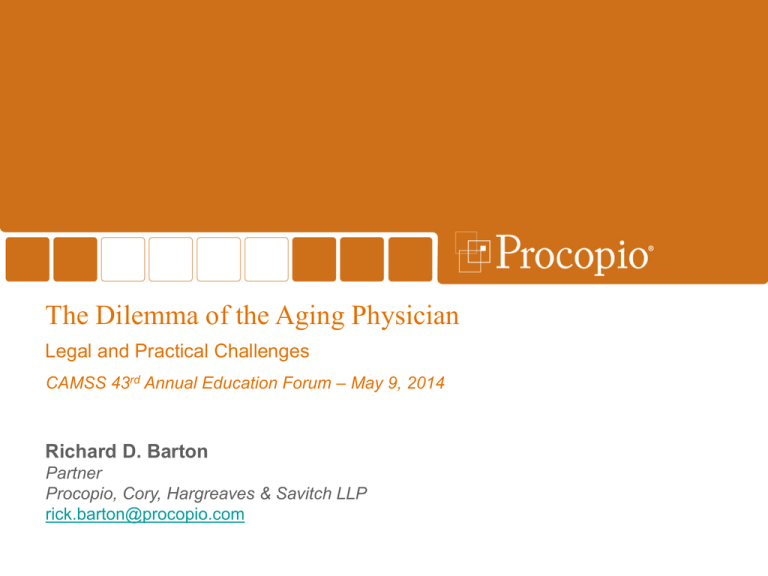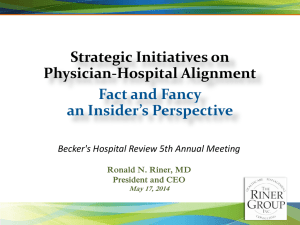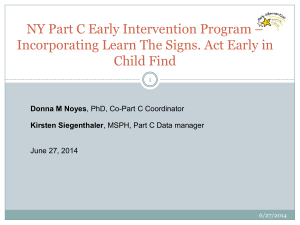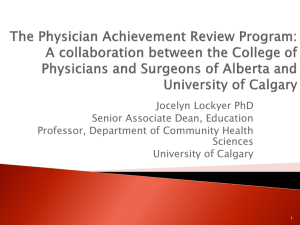Dilemma of the Aging Physician - CAMSS
advertisement

The Dilemma of the Aging Physician Legal and Practical Challenges CAMSS 43rd Annual Education Forum – May 9, 2014 Richard D. Barton Partner Procopio, Cory, Hargreaves & Savitch LLP rick.barton@procopio.com Meet Poppi Concerns with Late-Career Practitioners – The number of physicians over 65 has increased significantly; – Older physicians are more prone to cognitive impairment, substance abuse, depression, and physiologic decline; – A strong correlation between adverse patient events and conditions associated with aging The Dilemma of the Aging Physician • Affirmative duty to protect quality of care and monitor impaired physicians • Anti-discrimination laws prohibit discrimination on the basis of age and disability Late-Career Practitioner Policies • Mandatory retirement vs. screening for age-related impairments • Generally require screening exam of all physicians over a certain age • University of Virginia – 70 • Stanford – 75 • If screening uncovers an impairment, hospital must determine if physician can safely practice with reasonable accommodations • Goal is to be supportive and respectful and to suggest resources to assist the physician Civil Rights Act of 1964 signed into law by Lyndon Johnson on July 2, 1964 Anti-Discrimination Laws • Federal Laws – Title VII of the Civil Rights Act of 1964 – Age Discrimination in Employment Act of 1967 – Age Discrimination Act of 1975 – The Rehabilitation Act of 1973 – Americans with Disability Act of 1990 • State laws – Almost every state has anti-discrimination laws prohibiting discrimination based on age and disability • E.g. California – Fair Employment and Housing Act Age Discrimination in Employment Act (“ADEA”) • The ADEA prohibits employers from discriminating against persons aged 40 years or older in hiring, discharge, compensation, terms, conditions or privileges of employment. • In order to state a prima facie case Plaintiff must establish: • • • • Age 40 or above Subjected to adverse employment action A substantially younger person filled the position; and Qualified to do the job Are Physicians Employees Under the ADEA? • Courts usually rule that physicians are not employees in cases involving claims of discrimination based on medical staff membership – Kuck v. Bensen and St. Mary’s Hospital (D. Me. 1986) – Bender v. Suburban Hospital (4th Cir. 1998) – Shah v. Deaconess Hospital (6th Cir. 2004) – Vakharia v. Swedish Covenant Hospital (N.D. Ill. 1991) • But, Salamon v. Our Lady of Victory Hospital (2d. Cir. 2008) – Physician’s employment status is a question for the jury Bona Fide Occupational Qualification (“BFOQ”) Defense • It is not a violation of the act if an employer establishes an age requirement in furtherance of a bona fide occupational qualification – 29 U.S.C. § 623(f)(1) Age-Based Restrictions Permitted for Certain Professions • • • • • • • • Pilots Law Enforcement Firefighters Bus drivers Judges High Policy-Making Executives Law Firms Physicians? – Cal. Gov’t Code § 12942(c) Challenges to Age-Based Testing as Violation of ADEA • E.E.O.C. v. Com. of Mass. – Court strikes down Massachusetts law requiring all state employees over 70 to take an annual physical examination as violation of the ADEA • Epter v. New York City Transit Authority – New York Transit Authority policy of requiring all candidates over 40 seeking promotion to undergo a physical exam is discriminatory on its face – Court distinguishes cases where public safety is involved e.g. police officers Defending Late-Career Practitioner Policies Against Challenges Under the ADEA • Non-employed physicians do not have standing to sue • Must prove that age is a BFOQ for physicians to safely practice medicine and is a matter of public safety • Draw upon research finding correlation between age and adverse outcomes • Analogous to other public safety exceptions Americans with Disabilities Act (“ADA”) • Title I – Prohibits employers from discriminatorily terminating an otherwise qualified individual due to a disability – Must make “reasonable accommodations” unless would cause an “undue hardship” to employer – Must engage in interactive process with employee to find ways to reasonably accommodate Americans with Disabilities Act (“ADA”) • Title III: – Prohibits discrimination on the basis of disability with respect to public accommodations – No employment relationship requirement – Courts have held Title III of the ADA applies to nonemployee medical staff members • E.g. Menkowitz v. Pottstown Memorial Medical Center – Hospital summarily suspended medical staff privileges of physician with Attention Deficit Disorder, despite psychologist’s report that it would not affect his ability to treat patients. – Court said physician had standing to sue under Title III. ADA Limitations on Disability-Related Inquiries • Job related and consistent with business necessity • Generally, an employer can request an examination and documentation from employee regarding disability so long as reasonably related to job functions and based on reliable information that job performance and/or safety may be impaired. Periodic Testing and Monitoring Under the ADA – Employers may require periodic examinations of employees in positions affecting public safety- police officers and firefighters – Where examinations are required by safety regulations, employee cannot assert ADA as barrier to employer compliance with regulation, e.g. bus drivers and pilots required to undergo regular medical exams – Direct Threat - Employer may require examination if it reasonably believes employee poses a direct threat to safety to him or herself, or others. – Question of whether employee poses a direct threat must be based on individualized assessment of employee's ability to safely perform job duties. Defending Late-Career Practitioner Policies Against Challenges Under the ADA and Rehabilitation Act • Non-employed physicians do not have standing to sue hospital under ADA Title I, but may have standing under Title III • Screening policy is job related and consistent with business necessity • Age-based screening of physicians is a matter of public safety Responding to Concerns of Age-Related Impairments • If screening uncovers an impairment ADA requires: 1. Interactive process for addressing impairments 2. Reasonable accommodations • Create co-management privileges to transition from independent privileges to refer-and-follow • Refer-and-follow privileges are ambulatory privileges that allow physicians to refer patients to the hospital, order ancillary studies from an outpatient setting, and follow their patients in the hospital – Direct Threat Defense – Hospital can take action based on disability if physician cannot safely practice, even with reasonable accommodations Considerations in Crafting a Late-Career Practitioner Policy – What age? • Age should be directly related to increased risk of agerelated impairments – Type of screening? • Cognitive? Physical? “Fitness for Duty”? Mirco Cog? – Frequency of screening? • Annual? Bi-Annual with reappointment? – Who pays? – Hospital? Medical-staff? Physician? Combination? – Who performs the screening? – Who selects physician(s)? – Who oversees policy? • Credentialing? Well-being? Implications for Physicians, Hospitals & Patients – Courts will decide on a case-by-case basis – Goal should be to identify age-related impairments to ensure that physicians can continue to safely practice medicine as long as possible – Hospitals must respect physician’s rights every step along the way – Potential Liability for Failure to Act Richard D. Barton (619) 515-3299 rick.barton@procopio.com Procopio, Cory, Hargreaves & Savitch LLP San Diego, CA








